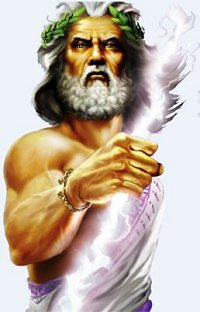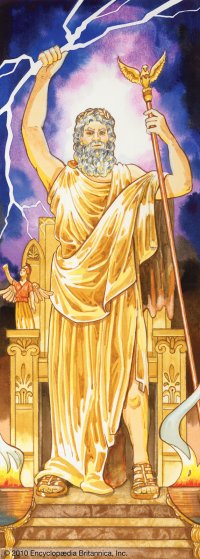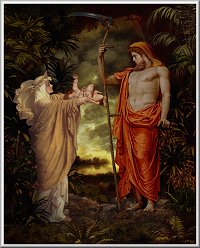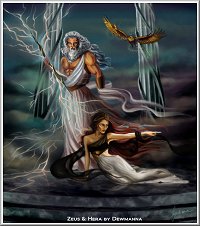
WELCOME MYTHMANIACS
TO THE MYTH OF THE MONTH

MYTH OF THE MONTH - JANUARY
MIGHTY ZEUS, KING OF THE OLYMPIANS
CHAPTER ONE - THE BEGINNING

Gods and mortals alike trembled at his terrible wrath when he was younger, and worshipped his benevolent kindness as he grew older and wiser. He caused rain, drought, good weather and bad weather. He commanded tempests and created storms.
He slept with a lot of women.
To see him for the first time in his waning years, with his thick, white beard, you'd wonder why everyone was so in awe of this gentle and elderly soul. You would be startled to discover that Zeus wasn't always the most solid pillar on Olympus. As a matter of fact, when he was young, he was quite the rebel.
Why don't you pull up a comfortable chair and join me as I share with you some of the colorful fables and foibles of Zeus, the king of the Olympians. I promise you will be entertained, and will come away with a deeper appreciation of the Lord of the Sky.
I rarely saw Zeus without his scepter in his hand. It was the insignia of his authority, that and the darn huge eagle always perched at his feet! That bird scared me silly, even after I got used to its presence.
The eagle never really did much, it just looked right through everyone with those majestic and piercing eyes, and once in a while it would leisurely stretch its enormous wings to their full span, shrinking the room significantly.
You just knew, however, that if you made one wrong move, or in any way threatened Zeus, in an instant the eagle would tear you to shreds and devour you just for fun! The only times I saw the eagle fly were to retrieve Zeus' thrown thunderbolts. Sort of like playing catch with your dog, only with much higher stakes.
I often asked Zeus if I could play with his favorite weapons, the thunderbolts, or at least just hold them, but beautiful Hera (Juno in Latin) made him keep them locked up in the war room whenever Zeus wasn't using them, or when the kids came to visit.
I saw him use them quite a few times, however, and I'm here to tell you that he was deadly! Beware of Zeus' thunderbolts!
The birth of Zeus was a real howl. The future King of the Olympians was the sixth child of Cronus (Saturn in Latin) and Rhea (Ops in Latin).
Remember Cronus? He was the surgeon wannabe who castrated his father Ouranos (Father Sky, Uranus in Latin) and seized control of the universe, way back when.
That vile act no doubt made for some rather tortured dreams, and Cronus constantly worried that one of his offspring would in turn supplant him. Matters were made worse when an oracle foretold that indeed he was destined to be deposed by one of his children. Cronus' meter was ticking. What's a paranoid god to do?
Cronus didn't want to be dethroned by his offspring, so he ate all the children that Rhea bore him immediately following their birth. A very disgusting habit, if you ask me, terrible way to control hunger and overpopulation. One by one, each child met the same fate.
No sooner were Hestia, Demeter, Hera, Hades and Poseidon born, but they found themselves trapped deep within father Cronus. I've heard of paternal bonding after birth, but that's downright ridiculous!
Mama Rhea found this hard to swallow. 'If the big lug wants to make lunch of my babies, let him carry them in his belly for nine months, and then let him experience the excruciating joy of childbirth!' she would mutter. 'Probably change his mind about what he puts in his mouth!'
Finally having had enough, Rhea tricked Cronus with the birth of her sixth child, Zeus, by replacing him with a large stone wrapped in baby comforters. Cronus swallowed down the stone and thought himself safe. I'm not making this up.
Man, did that lead to some animated discussions between the ancient poets Homer and Hesiod, down at Thanasi's Olympus Greek Restaurant, past and present eatery to the gods:
"Ok, now you've gone too far, Hesiod! Who in Hades is gonna believe that Cronus ate a very big stone and thought it was Zeus he swallowed? How stupid can he be? This is the ruler of the universe you're talking about, you fool, and you're saying that he doesn't know the difference between a stone and a newborn baby? Give me a break!"
"Homer my boy, you must learn to relax. Have I ever told you about the Eastern religions? Repeat after me: Ommm...Waitress, some decaf Ambrosia for my young friend, regular for me. Listen up, I'm only going to say this once.
"This is mythology. None of it has to make any sense, as long as it's got violence, sex, beautiful nymphs, men built like gods, gods built like men, men built like horses, lots of scheming, intrigue and wine, and the odd moral lesson learned.
"The rest is up to your imagination. Go wild if you must, invent all kinds of stories about the origin of natural phenomena, the public eats it up."
Hesiod. How I loved him - he was cooler than the other side of the pillow. Hesiod was the first mortal Greek to wonder how everything had happened, the cause of the world, the seas and the sky, gods and humans, and to try to come up with an explanation.
I once asked him if the Muses were the source of his divine inspiration, and he replied, no, it was the magic mushrooms growing profusely at the foothills of the Acropolis. Funny guy.
I remember him reading to us from his classic book, The Theogony (Birth of the Gods) back when it was still in rough draft. That's how many ancients learned their rich history. For centuries his account of the creation of the universe, and the generations of gods, has been a must-read for lovers of Greek mythology.
So Cronus swallowed Rhea's ruse, and the infant Zeus was secreted to Gaia (Mother Earth). She took the baby to Lyctos on the island of Crete and hid him in Dicte's cave, where the ash nymph Adrasteia and her sister Ide were placed in charge of his care. They guarded the child in the cave and tried to prevent Cronus from discovering his existence.
The ash nymphs took great pains to safeguard the baby. They even hung Zeus in a cradle from a tree, so that he could be found neither in heaven nor on earth nor in the sea and, gathering youths, gave them brazen shields and spears and asked them to go around the tree clashing their shields and making noise lest the cries of little Zeus be heard.
(Someone should have pointed out that it was the clashing of the shields and the cacophony that was making the baby cry in the first place! Those silly, silly Greeks!)
These Curetes, as they were known, were assisted in his upbringing by the divine goat Amaltheia. The goat's name means 'tender'.
I kid you not. The divine goat nymph he called Amy loved Zeus tenderly and suckled him on Crete, and when she died he used Amaltheia's skin to create the Aegis, the legendary shield of Athena.
Out of gratitude Zeus also turned one of Amy's horns into the Cornucopia ("Horn of Plenty") which was always filled with whatever goodies its possessor wished for. I bet you didn't know that's how the Cornucopia came to be!
(An inebriated Zeus forgot it at Thanasi's one night, and we got to mess around with the Cornucopia...let's just say the cellars and storerooms got filled quickly.)
Yet if you listened in on some late night debates down at Thanasi's Olympus, you'd learn that Amaltheia was also considered to be simply a Nymph who nourished Zeus with honey and the milk of a goat.
Other versions have the Nymph Neda rearing Zeus. Face it, once he became king of the gods, just about everyone wanted to associate themselves with Zeus, and countless women claimed to have nursed him.
(One way or another.)
You decide for yourself. As for me, I'm all for the divine goat version, I swear I've seen Zeus shed a tear when he speaks of his little goat Amy. Using the hide of Amaltheia as his armor, armed with his Aegis, Zeus set out to seize power.
And that's when things started getting real interesting.
Click on Chapter Two to continue the satirical Zeus Myth of the Month.



